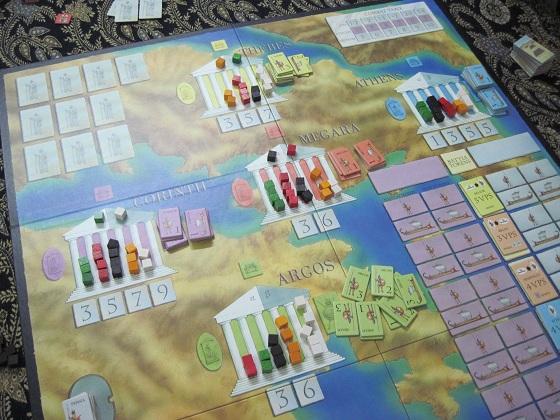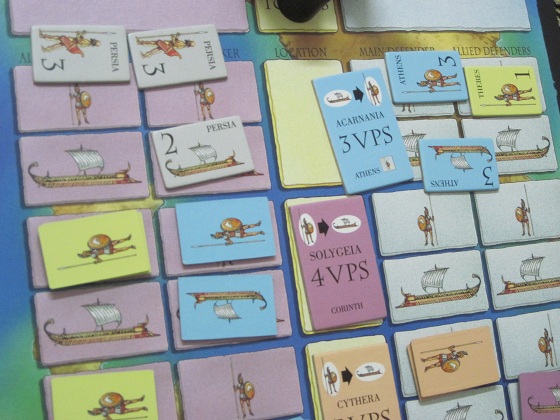
Perikles is an odd hybrid of an area control game and a wargame that we played with five players. I’m pretty sure that it’s pronounced Peri-cleese, like the way Achilles is pronounced, rather than the more English sounding Pericals, but I didn’t make a fuss over it. The name refers to a statesman of the 5th century, under whom Athens enjoyed a Golden Age and which subsequently became known as the Age of Perikles. There are six city-states on the board and during each round, players start by vying for control of them. Once control has been established, the players deploy the armies of each city that they control as they see fit in each of the seven battles per round.
- The main twist to the usual area-control mechanics that this game uses is that pure majority of control tokens doesn’t suffice to gain control of a city-state. Instead, each city-state has two open spaces for candidates and at the end of each round, only the tokens of the players with candidates are counted. This means that having lots of tokens in an area counts for nothing if your candidate doesn’t get nominated. Allen pulled a nasty trick on me when I nominated a weak opponent to stand against me, as the winning candidate must sacrifice tokens equal to the support of the losing candidate. Allen subsequently assassinated my candidate. Since he was in front of me in turn order, he was able to nominate his own candidate to the newly empty spot before I had a chance to do so.
- The wargame part is represented by the seven battles that must be fought each round. The game uses a combat table that feels a bit archaic to determine what number each player needs to roll to get a hit on the opposing player. Like all dice based results, this can lead to some pretty wild swings of luck. I guess I’m still a bit sour over gaining control of Athens in the first round but failing to achieve much with its forces despite superior odds. The same thing happened to me when I managed to gain control of Sparta.
- Each time you gain control of a city-state, you gain a statue there. Each statue is then worth a variable number of points, depending on whether it has been successfully conquered. I guess I messed up here and underestimated the points value from this system as I used Sparta to assault Athens when I had a statue there.
- Allen played very well in this game, gaining control of cities while not having obvious majorities in them and losing very few support tokens to do so. Hiew surprisingly came in last, probably because he was perceived as the leader in the first round and so became public enemy number one. Shan did well too, though part of it was because the other players gave her a free ride by not attacking her cities, giving her automatic victories a few times.
- Each player gets a special once-per-game power. I never used mine. It was the ability to remove a Sparta hoplite token from the board during the deployment phase. I expected to use it in the second round when Allen was playing Sparta but he never committed forces against me. And of course, in the last round, I found myself in control of Sparta myself.
- Conventional wisdom in this game is to gain control of Athens or Sparta, as these two have the biggest armies, but the fixed set of battle tiles ensures that most fighting will take place in Athens or Sparta so these two are guaranteed to fight each other all the time. This means that both of them are sure to get conquered. Conversely, the smaller cities get invaded very rarely and even though their forces are much weaker, their controller can easily commit everything to defending just one place so they’re almost guaranteed to be worth a ton of points per statue at the end of the game.
I originally expected this game to be more like Struggle of Empires, particularly in having revolving alliances, but as there is little point in being an ally instead of a main participant in a battle, I don’t believe anyone actually chose to do this in the entire game. Theoretically, you can ally to defend a city you’re invested in or to reduce the points value of cities you have no interest in, but since deployment opportunities are so limited, it’s hard to imagine why you wouldn’t want to focus everything on the battles in which you are actually the main participant. Overall, another very neat design by Martin Wallace, but less randomness in die rolls please!

Leave a Reply